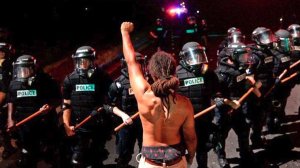In just over the past year, Braxton Winston has gone from a prominent protester to a popular politician.
Last September, Winston was the center of a dramatic photo from Charlotte, North Carolina, showing him shirtless and with his fist raised, facing a line of police wearing riot gear and holding batons.
Soon, though, he’ll be joining the Charlotte City Council after he was elected as an at-large council member on November 7. And the path that led him to the council began specifically on September 20, 2016, the night that photo was taken.

“My life changed (that day),” Winston told CNN. “That day, the history of Charlotte changed. I think the trajectory is different from that day.”
His path from that iconic photo to the City Council won him high-profile applause from Chelsea Clinton and hip-hop icon Common, who called him a “true inspiration.”
Charlotte protests
The protests that erupted in Charlotte began after police shot and killed Keith Lamont Scott, an African-American man.
Scott’s family said that he was unarmed and that he was in his car reading a book when he was killed. Police said Scott was armed and refused to put down his gun, and they said that no book was found at the scene. Two months later, investigators would find that Charlotte-Mecklenburg Police officer Brentley Vinson was justified in his decision to shoot Scott.
In an echo of the Black Lives Matter demonstrations of the past few years, protesters in Charlotte took to the streets in a call for an end to inequality and police brutality against people of color.
Winston, a North Carolina native and Davidson College graduate, was one of those protesters. He said he was coming home from coaching middle school football when he heard about the shooting, so he went to the scene to see it for himself.
As he puts it, he and others began asking questions and having “uncomfortable conversations” with police and others around.
“How would I train my son to act in a way that would protect himself?” he thought at the time, he said. “And I didn’t have the answers to that. So I started asking questions as well.”
Those conversations escalated, and officials eventually sent in riot cops, who shot tear gas at protesters to clear the scene. Winston said the reason he was shirtless in that famous photo is because his shirt was being used as a mask amid clouds of tear gas.
The photo didn’t directly cause him to run for City Council, he said. But his presence at a number of protests and his willingness to get involved put him in contact with community leaders.
As he became more involved, “it became clear that I could play or needed to play some type of leadership or change agent role in the city,” he said. So in June, Winston, whose father was a Marine and whose mother was a school teacher, decided to run for the council.
What’s next
Winston, who grew up in Brooklyn after his parents moved from North Carolina, said he wants to work on ending the inequalities in Charlotte and change the civic system to get more people to participate. He wants to be an agent of change, but he recognized that some things need to stay the same, such as trash collection and clean running water.
“We’re trying to learn how to run a city while still being dedicated and active in changing the inequities of the system that do pervade around us,” he said.
He’s seen an outpouring of support since his election a week and a half ago. He grew up on Common’s music, so the artist’s supportive tweets were particularly meaningful.
Looking back at that viral photo, Winston said there was a clear lesson for him.
“I want people to take out of that picture that I’m willing to have the uncomfortable and inconvenient conversations,” he said. “I’m willing to stand up for everybody to have those conversations.”
“I think that’s the idea of America. We have to be willing to get out of our comfort zones and stand in the middle and try to find some common ground, however difficult that may be, however painful that may be.”














